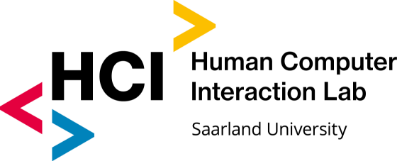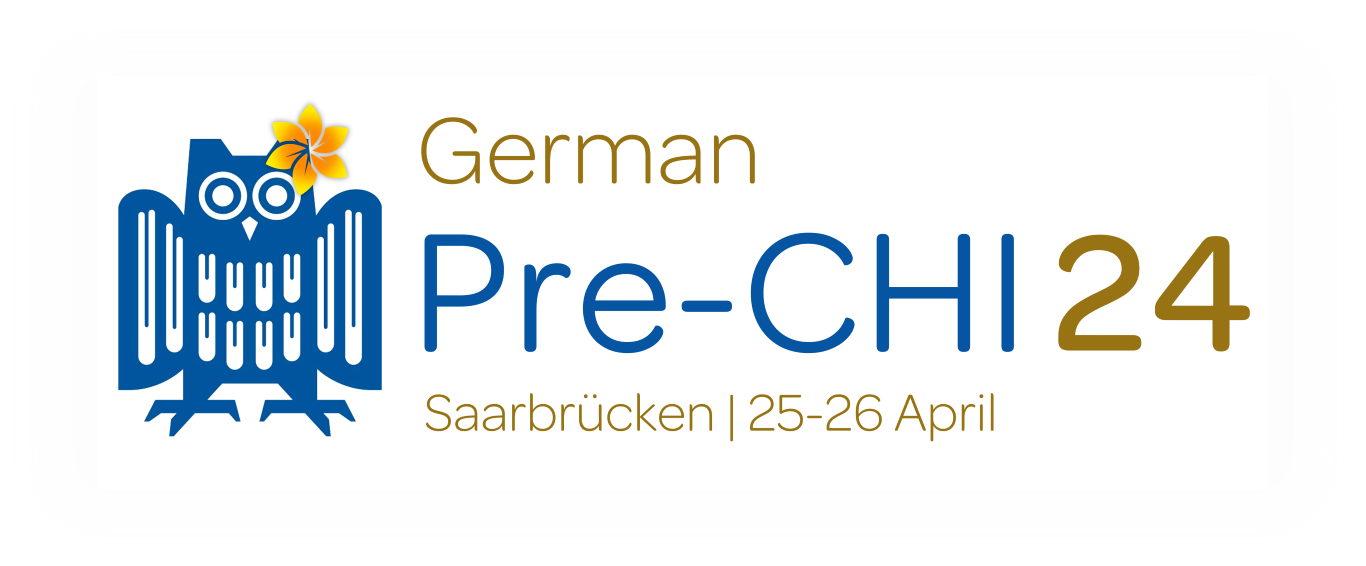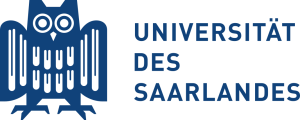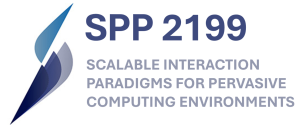German Pre-CHI 2024
April 25-26, 2024 – in Saarbrücken, Germany
Following the tradition of bringing the German HCI community and friends together before going to CHI, the German Pre-CHI 2024 will be hosted in Saarbrücken. The idea of the event is to provide an opportunity for researchers from Germany and neighboring countries to present their accepted CHI 2024 papers and discuss them in a smaller circle. Additionally, it provides an excellent opportunity for younger researchers to get a taste of the quality of work presented at CHI and network with other peers, as well as senior researchers. Therefore, everyone from students to professors interested in HCI is welcome.
The event is taking place over two days and includes paper talks, poster & demo sessions, coffee breaks, lunch, and lots of informal discussions. We are planning to have several paper sessions, in which young researchers will present their paper talks. After each presentation, we will have a discussion session, which will include the “usual” CHI discussion, but also comments and suggestions on presentation style, slides, etc. in order to optimally prepare you for a presentation at CHI. There will also be an informal session where late-breaking works and demos can be presented and discussed.
This year, we are also introducing a new discussion format for seniors to discuss nationwide funding and teaching strategies.
Program
Schedule
Day 1: Thursday, April 25
| Time | Program | Place |
|---|---|---|
| 08:45-09:30 | Registration | E1 5, foyer |
| 09:30-09:45 | Welcome | E1 5, 002 |
| 09:45-11:00 | Session 1: Games & Sustainability | E1 5, 002 |
| 11:00-11:30 | Coffee Break | E1 5, foyer |
| 11:30-12:45 | Session 2: Interacting in Mixed Reality | E1 5, 002 |
| 12:45-14:00 | Lunch (finger food) in parallel: Women’s Lunch at AC |
E1 5, foyer A3 2 |
| 14:00-15:30 | Session 3: Humans, Robots, & AI in parallel: Session 4: Ethics & Wellbeing |
E1 5, 002 E1 3, 0.02.1 |
| 15:30-16:30 | Coffee Break + Poster & Demo Session | E1 5, foyer |
| 16:30-18:30 | Lab tours (DFKI, MPI-Inf, university labs) in parallel: How to DFG (~1 hour) |
E1 5, foyer E1 5, 002 |
| 19:30 | Dinner (self-paid) at Ratskeller Saarbrücken | Rathausplatz |
Day 2: Friday, April 26
| Time | Program | Place |
|---|---|---|
| 09:00-10:30 | Session 5: Motion-based Interactions & Empathy in parallel: Session 6: Privacy & Security |
E1 5, 002 E1 3, 0.02.1 |
| 10:30-11:00 | Coffee Break | E1 5, foyer |
| 11:00-12:30 | Session 7: Haptics in parallel: Roundtable discussion (seniors only) |
E1 5, 002 E1 1, 407 |
| 12:30-12:45 | Closing | E1 5, 002 |
| 12:45-14:00 | Optional Lunch (self-paid, self-organized) |
Venue & Locations
The Pre-CHI 2024 is held on Saarbrücken University Campus (Maps).
Registration, coffee breaks, lunch, and the demo & poster session happen in the foyer of the Max-Planck-Institute for Software Systems, building E1 5 (Google Maps).
The second paper track happens in building E1.3, room 0.02.1.
The following map lists the most important locations (including social events, lab tours, and transport):
Session Details
Paper Sessions
Session 1: Games & Sustainability
Session Chair: Marion Koelle
Room: E1 5, 002 (MPI-SWS)
Time: Thursday, 09:45 – 11:00
-
“I Know What You Mean”: Context-Aware Recognition to Enhance Speech-Based Games
Nima Zargham (Digital Media Lab, University of Bremen), Mohamed Lamine Fetni (Digital Media Lab, University of Bremen), Laura Spillner (Digital Media Lab, University of Bremen), Thomas Münder (Digital Media Lab, University of Bremen), Rainer Malaka (Digital Media Lab, University of Bremen)
-
Evgeny Stemasov (Institute of Media Informatics, Ulm University), Tobias Wagner (Institute of Media Informatics, Ulm University), Ali Askari (Institute of Media Informatics, Ulm University), Jessica Janek (Institute of Media Informatics, Ulm University), Omid Rajabi (Institute of Media Informatics, Ulm University), Anja Schikorr (Institute of Media Informatics, Ulm University), Julian Frommel (Utrecht University), Jan Gugenheimer (TU-Darmstadt, Institut Polytechnique de Paris, Enrico Rukzio (Institute of Media Informatics, Ulm University)
-
Mark Colley, Beate Wanner, Max Rädler, Marcel Rötzer, Julian Frommel, Teresa Hirzle, Pascal Jansen, Enrico Rukzio
-
Outplay your weaker self: A mixed-methods study on gamification to overcome procrastination in academia
Jeanine Kirchner-Krath (FAU Erlangen-Nürnberg), Manuel Schmidt-Kraepelin (KIT), Sofia Schöbel (Universität Osnabrück), Mathias Ullrich (Universität Koblenz), Ali Sunyaev (KIT), Harald von Korflesch (Universität Koblenz)
-
SustAInable: How Values in the Form of Individual Motivation Shape Algorithms’ Outcomes. An Example Promoting Ecological and Social Sustainability.
Sarah Zabel, Siegmar Otto (University of Hohenheim)
Session 2: Interacting in Mixed Reality
Session Chair: Donald Degraen
Room: E1 5, 002 (MPI-SWS)
Time: Thursday, 11:30 – 12:45
-
Christopher Katins (HU Berlin), Paweł W. Woźniak (Chalmers University of Technology), Aodi Chen (HU Berlin), Ihsan Tumay (HU Berlin), Luu Viet Trinh Le (HU Berlin), John Uschold (HU Berlin), Thomas Kosch (HU Berlin)
-
Just Undo It: Exploring Undo Mechanics in Multi-User Virtual Reality
Julian Rasch (LMU Munich), Florian Perzl (LMU Munich), Yannick Weiss (LMU Munich), Florian Müller (LMU Munich)
-
Evgeny Stemasov (Institute of Media Informatics, Ulm University), Simon Demharter (Institute of Media Informatics, Ulm University), Max Rädler (Institute of Media Informatics, Ulm University), Jan Gugenheimer (TU-Darmstadt, Institut Polytechnique de Paris), Enrico Rukzio (Institute of Media Informatics, Ulm University)
-
Predicting the Noticeability of Dynamic Virtual Elements in Virtual Reality
Zhipeng Li (ETH), Yi Fei Cheng (CMU), Yukang Yan (Rochester), David Lindlbauer (CMU)
-
Uncovering and Addressing Blink-Related Challenges in Using Eye Tracking for Interactive Systems
Jesse W. Grootjen (LMU Munich), Henrike Weingärtner (LMU Munich), Sven Mayer (LMU Munich)
Session 3: Humans, Robots, & AI
Session Chair: Larbi Abdenebaoui
Room: E1 5, 002 (MPI-SWS)
Time: Thursday, 14:00 – 15:30
-
An Evaluation of Situational Autonomy for Human-AI Collaboration in a Shared Workspace Setting
Vildan Salikutluk (TU Darmstadt), Janik Schöpper (TU Darmstadt), Franziska Herbert (TU Darmstadt), Katrin Scheuermann (TU Darmstadt), Eric Frodl (TU Darmstadt), Dirk Balfanz (TU Darmstadt), Frank Jäkel (TU Darmstadt), Dorothea Koert (TU Darmstadt)
-
Giving Robots a Voice: Human-in-the-Loop Voice Creation and open-ended Labeling
Pol van Rijn (MPIAE), Silvan Mertes (HCAI, Augsburg), Kathrin Janowski (HCAI, Augsburg), Katharina Weitz (HCAI, Augsburg), Nori Jacoby (MPIAE), Elisabeth André (HCAI, Augsburg)
-
Let’s Talk About Death: Existential Conversations with Chatbots
Ruben Albers (University of Siegen), Marc Hassenzahl (University of Siegen)
-
“If the Machine Is As Good As Me, Then What Use Am I?” – How the Use of ChatGPT Changes Young Professionals’ Perception of Productivity and Accomplishment
Charlotte Kobiella (CDTM), Yarhy Said Flores López (CDTM), Franz Waltenberger (CDTM), Fiona Draxler (University of Mannheim), Albrecht Schmidt (LMU Munich)
-
Thomas Mildner (University of Bremen), Orla Cooney (School of Information and Communication Studies, University College Dublin), Anna-Maria Meck (Ludwig Maximilan University of Munich), Marion Bartl (University College Dublin), Gian-Luca Savino (University of St. Gallen), Philip R Doyle (University College Dublin), Diego Garaialde (University College Dublin), Leigh Clark (Bold Insight), John Sloan (Trinity College Dublin), Nina Wenig (University of Bremen), Rainer Malaka (University of Bremen), Jasmin Niess (University of Oslo)
-
Saja Aljuneidi (OFFIS – Institute for Informatik), Wilko Heuten (OFFIS – Institute for Informatik), Larbi Abdenebaoui (OFFIS – Institute for Informatik), Maria Wolters (OFFIS – Institute for Informatik), Susanne Boll (Carl von Ossietzky Universität Oldenburg)
Session 4: Ethics & Wellbeing
Session Chair: Siegmar Otto
Room: E1 3, 0.02.1
Time: Thursday, 14:00 – 15:30
-
A Longitudinal In-the-Wild Investigation of Design Frictions for Smartphone Overuse
Luke Haliburton (LMU Munich, MCML), David J. Grüning (Heidelberg University), Frederik Riedel (riedel.wtf GmbH), Albrecht Schmidt (LMU Munich), Nađa Terzimehić (LMU Munich)
-
Colin M. Gray (UXP2 Lab, Indiana University), Cristiana Teixeira Santos (School of Law, Utrecht University), Nataliia Bielova (Inria Sophia Antipolis), Thomas Mildner (Universität Bremen)
-
Divyanshu Bhardwaj (CISPA Helmholtz Center for Information Security, Saarland University), Carolyn Guthoff (CISPA Helmholtz Center for Information Security, Saarland University), Adrian Dabrowski (CISPA Helmholtz Center for Information Security), Sascha Fahl (CISPA Helmholtz Center for Information Security), Katharina Krombholz (CISPA Helmholtz Center for Information Security)
-
Real-World Winds: Micro Challenges to Promote Balance Post Smartphone Overload
Nađa Terzimehić (LMU Munich), Julia Huber (LMU Munich), Sarah Aragon-Hahner (LMU Munich), Sven Mayer (LMU Munich)
-
The Social Journal: Investigating Technology to Support and Reflect on Meaningful Social Interactions
Sophia Sakel (LMU Munich), Tabea Blenk, Albrecht Schmidt (LMU Munich), Luke Haliburton (LMU Munich)
-
Fighting Malicious Designs: Towards Visual Countermeasures Against Dark Patterns
René Schäfer (RWTH Aachen University), Paul Preuschoff (RWTH Aachen University), René Röpke (RWTH Aachen University), Sarah Sahabi (RWTH Aachen University), and Jan Borchers (RWTH Aachen University)
Session 5: Motion-based Interactions & Empathy
Session Chair: Yi-Chi Liao & Madalina Nicolae
Room: E1 5, 002 (MPI-SWS)
Time: Friday, 09:00 – 10:30
-
Perceived Empathy of Technology Scale (PETS): Measuring Empathy of Systems Toward the User
Matthias Schmidmaier (LMU Munich), Jonathan Rupp (University of Innsbruck
Innsbruck), Darina Cvetanova (LMU Munich), Sven Mayer (LMU Munich) -
A Meta-Bayesian Approach for Rapid Online Parametric Optimization for Wrist-based Interactions
Yi-Chi Liao (Aalto University, Saarland University), Ruta Desai (Meta), Alec M Pierce (Meta), Krista Taylor (Meta), Hrvoje Benko (Meta), Tanya Jonker (Meta), Aakar Gupta (Meta, Fujitsu)
-
Controlling the Rooms: How People Prefer Using Gestures to Control Their Smart Homes
Masoumeh Hosseini, Heiko Müller, Susanne Boll (University of Oldenburg)
-
Design Space of Visual Feedforward And Corrective Feedback in XR-Based Motion Guidance Systems
Xingyao Yu, Benjamin Lee, Michael Sedlmair (University of Stuttgart)
-
Jonathan Liebers, Patrick Laskowski, Florian Rademaker, Leon Sabel, Jordan Hoppen, Uwe Gruenefeld, Stefan Schneegass (University of Duisburg-Essen)
-
Sitting Posture Recognition and Feedback: A Literature Review
Christian Krauter (University of Stuttgart), Katrin Angerbauer (University of Stuttgart), Aimée Sousa Calepso (University of Stuttgart), Alexander Achberger (University of Stuttgart), Sven Mayer (LMU Munich), Michael Sedlmair (University of Stuttgart)
Session 6: Privacy & Security
Session Chair: Ceenu George
Room: E1 3, 0.02.1
Time: Friday, 09:00 – 10:30
-
‘We Do Not Have the Capacity to Monitor All Media’: A Design Case Study on Cyber Situational Awareness in Computer Emergency Response Teams
Marc-André Kaufhold (TU Darmstadt), Thea Riebe (TU Darmstadt), Markus Bayer (TU Darmstadt), Christian Reuter (TU Darmstadt)
-
Better Together: The Interplay Between a Phishing Awareness Video and a Link-centric Phishing Support Tool
Benjamin Berens (KIT), Florian Schaub (Michigan University), Mattia Mossano (KIT), Melanie Volkamer (KIT)
-
Decide Yourself or Delegate – User Preferences Regarding the Autonomy of Personal Privacy Assistants in Private IoT-Equipped Environments
Karola Marky (Ruhr University Bochum), Alina Stöver (Technische Universität Darmstadt), Sarah Prange (University of the Bundeswehr Munich), Kira Bleck (Technische Universität Darmstadt), Paul Gerber (Technische Universität Darmstadt), Verena Zimmermann (ETH Zürich), Florian Müller (LMU Munich), Florian Alt (University of the Bundeswehr Munich), Max Mühlhäuser (Technische Universität Darmstadt)
-
In Focus, Out of Privacy: The Wearer’s Perspective on the Privacy Dilemma of Camera Glasses
Divyanshu Bhardwaj (CISPA Helmholtz Center for Information Security, Saarland University), Alexander Ponticello (CISPA Helmholtz Center for Information Security, Saarland University), Shreya Tomar (Indraprastha Institute of Information Technology Delhi), Adrian Dabrowski (CISPA Helmholtz Center for Information Security), Katharina Krombholz (CISPA Helmholtz Center for Information Security)
-
My Data, My Choice, My Insights:Women’s Requirements when Collecting, Interpreting and Sharing their Personal Health Data
Sophie Grimme (OFFIS – Institute for IT), Susanna Marie Spörl (OFFIS – Institute for IT), Susanne Boll (University Oldenburg), Marion Koelle (OFFIS – Institute for IT)
-
Self-Efficacy and Security Behavior: Results from a Systematic Review of Research Methods
Nele Borgert (Ruhr University Bochum, University of Bern); Luisa Jansen (Ruhr University Bochum, University of Bern); Imke Böse (Ruhr University Bochum); Jennifer Friedauer (Ruhr University Bochum); M. Angela Sasse (Ruhr University Bochum); Malte Elson (Ruhr University Bochum, University of Bern)
Session 7: Haptics
Session Chair: Easa AliAbbasi
Room: E1 5, 002 (MPI-SWS)
Time: Friday, 11:00 – 12:30
-
Understanding User Acceptance of Electrical Muscle Stimulation in Human-Computer Interaction
Sarah Faltaous (University Duisburg-Essen), Julie R. Williamson (University of Glasgow), Marion Koelle (OFFIS – Institute for Information Technology), Max Pfeiffer (Aldi Sued), Jonas Keppel (University of Duisburg-Essen), Stefan Schneegass (University of Duisburg-Essen)
-
Carolin Stellmacher (University of Bremen), Feri Irsanto Pujianto (Quality and Usability Lab, Technische Universität Berlin), Tanja Kojić (Quality and Usability Lab, Technische Universität Berlin), Jan-Niklas Voigt-Antons (Immersive Reality Lab, Hamm-Lippstadt University of Applied Sciences), Johannes Schöning (University of St. Gallen)
-
Exploring Mobile Devices as Haptic Interfaces for Mixed Reality
Carolin Stellmacher (University of Bremen), Florian Mathis (University of St. Gallen), Yannick Weiss (LMU Munich), Meagan B. Loerakker (Chalmers University of Technology), Nadine Wagener (University of Bremen), Johannes Schöning (University of St. Gallen)
-
Improving Electromyographic Muscle Response Times through Visual and Tactile Prior Stimulation in Virtual Reality
Jessica Sehrt (FUAS), Leonardo Leite Ferreira (FUAS),
Karsten Weyers (FUAS), Amir Mahmood (FUAS), Thomas Kosch (HU Berlin), Valentin Schwind (FUAS) -
MobileGravity: Mobile Simulation of a High Range of Weight in Virtual Reality
Alexander Kalus (University of Regensburg), Johannes Klein (University of Regensburg), Tien-Julian Ho (University of Regensburg), Lee-Ann Seegets (University of Regensburg), Niels Henze (University of Regensburg)
-
Shaping Compliance: Inducing Haptic Illusion of Compliance in Different Shapes with Electrotactile Grains
Arata Jingu (Saarland University, HCI Lab), Nihar Sabnis (Sensorimotor Interaction, Max Planck Institute for Informatics), Paul Strohmeier (Sensorimotor Interaction, Max Planck Institute for Informatics), Jürgen Steimle (Saarland University, HCI Lab)
Poster & Demo Session
-
Look Over Here! Comparing Interaction Methods for User-Assisted Remote Scene Reconstruction
Carina Liebers (University of Duisburg-Essen),Niklas Pfützenreuter (University of Duisburg-Essen), Marvin Prochazka (University of Duisburg-Essen), Pranav Megarajan (OFFIS – Institute for IT), Eike Furuno (OFFIS – Institute for IT), Jan Löber (University of Duisburg-Essen), Tim C. Stratmann (OFFIS – Institute for IT), Jonas Auda (University of Duisburg-Essen), Donald Degraen (University of Duisburg-Essen), Uwe Gruenefeld (University of Duisburg-Essen), Stefan Schneegass (University of Duisburg-Essen)
-
Closing the Loop: The Effects of Biofeedback Awareness on Physiological Stress Response Using Electrodermal Activity in Virtual Reality
Jessica Sehrt (FUAS), Ugur Yilmaz (FUAS), Thomas Kosch (HU Berlin), Valentin Schwind (FUAS)
-
Giggling in the Shower: Humor Increases the Acceptance of Technology-mediated Behavioral Interventions.
Till Maria Jürgens (University of Siegen), Marc Hassenzahl (University of Siegen), Lara Christoforakos (Ludwig-Maximilians-University Munich), Matthias Laschke (University of Siegen)
-
“Tele” Me More: Using Telepresence Charades to Connect Strangers and Exhibits in Different Museums
Clara Sayffaerth (LMU Munich), Julian Rasch (LMU Munich), Florian Müller (LMU Munich)
-
Exploring Spatial Organization Strategies for Virtual Content in Mixed Reality Environments
Weizhou Luo (Technische Universität Dresden)
-
Empowering Learners: Chatbot Mediated ‘Learning-by-Teaching’
Nihar Sabnis (Max Planck Institute for Informatics, Saarland Informatics Campus), Tomohiro Nagashima (Saarland Informatics Campus)
-
Mappings in the Home: Selecting Home Appliances in 3D Space
Oliver Nowak (RWTH Aachen University), Lennart Becker (RWTH Aachen University), and Sebastian Pettirsch (RWTH Aachen University)
-
How’s Your Sewing? Investigating Metrics to Automatically Assess Sewing Expertise
Marcel Lahaye (RWTH Aachen University), Ricarda Rahm (RWTH Aachen University), Judith Ernstberger (RWTH Aachen University), and Andreas Dymek (RWTH Aachen University)
-
Employing Physiological Sensing for Exteroceptive-Interoceptive Sensory Substitution in NeuroHCI
Amber Maimon, Iddo Yehoshua Wald (Bremen University)
Demos
-
Effects of a Gaze-Based 2D Platform Game on User Enjoyment, Perceived Competence, and Digital Eye Strain
Mark Colley, Beate Wanner, Max Rädler, Marcel Rötzer, Julian Frommel, Teresa Hirzle, Pascal Jansen, Enrico Rukzio
-
World-Wide-Lab: A new Open-Source Platform for Running Large-Scale Citizen Science Studies
Jan Simson, Josh de Leeuw, Felix Henninger, Samuel Mehr
Women’s Lunch
There will be a Women’s lunch, hosted by Anna Maria Feit and Susanne Boll, on campus during the lunch on Thursday. The idea of the lunch is to foster connections between women in HCI, to share stories and experiences, to understand challenges and successes of women, etc. During the lunch we will discuss in small table groups topics such as work-life balance, diverse success paths, mentoring networks, career planning, and more.
- Where? AC Saarbrücken (Campus A3 2; Google Maps)
- When? Thursday, 12:45 – 14:00
- How to get there? We recommend to walk on campus.
Lab Tours
The lab tours will allow all participants to see selected demonstrations of the different HCI labs at Saarland Informatics Campus.
- MMCI: HCI Lab, Computational Interaction Group, Sensorimotor Interaction Group, Technology-Enhanced Learning
- MPI-Inf: Graphics and Vision for Digital Humans Group
- DFKI: Ubiquitous Media Technology Lab
- Where? E1 5 Foyer (MPI-SWS)
- When? Thursday, 16:30 – 18:30
- How to get there? Just stay at the main venue.
The lab tours will consist of three groups. Each group will be guided by one person. You can see the planned schedule for each group below:
| Time | MMCI | MPI-Inf | DFKI |
|---|---|---|---|
| 16:45 – 17:10 | Group 1 | Group 2 | Group 3 |
| 17:20 – 17:45 | Group 2 | Group 3 | Group 1 |
| 17:55 – 18:20 | Group 3 | Group 1 | Group 2 |
Dinner
There will be a joint dinner (self-paid) on Thursday evening.
- Where? Ratskeller Saarbrücken (Rathausplatz 1, 66111 Saarbrücken; Google Maps)
- When? Thursday, 19:30
- How to get there? We recommend to use public transport (SaarVV). Take the bus (e.g, 101, 102, 150, 11, 109) from Universität Mensa or Universität Busterminal to Rathaus or Johanniskirche.
How to DFG
Susanne Boll and Albrecht Schmidt report on their experiences from the various DFG programs, submitting and reviewing, statistics, etc., followed by a Q&A session.
- Where? E1 5, 002
- When? Thursday, 16:30 – 17:30
Roundtable Discussion Session for Senior Members
A roundtable discussion for senior members (professors and research group leaders) of the German HCI community to discuss nationwide funding and teaching strategies.
- Where? E1 1 407
- When? Friday, 11:00 – 12:30
Registration & Traveling
Participation is free of charge. However, costs for traveling and accommodation are self-paid.
Registration is closed.
Traveling by …
- … car? We recommend to drive to this parking area P3 near the main venue.
- … train? We recommend to take the bus 112 or 124 at the main train stations directly to Universität Mensa or Universität Busterminal. Alternatively, you can take any bus to Rathaus or Johanniskirche (e.g, 101, 102, 150, 11, 109) and walk to the train station (~10 minutes walking distance).
Accommodation
Saarbrücken offers a large variety of hotels. Here are some examples:
- Hotel Leidinger, Mainzer Str. 10, 66111 Saarbrücken, Tel.: 0049 681 93270
- Motel One, Schillerpl. 4, 66111 Saarbrücken, Tel.: 0049 681 371903
- Intercity Hotel, Hafenstraße 25, 66111 Saarbrücken, Tel.: 0049 681 95070000
- Premier Inn, Faktoreistraße 2, 66111 Saarbrücken, Tel.: 0049 681 933 57697
- Hotel Weller, Neugrabenweg 8, 66123 Saarbrücken, Tel.: 0049 681 371903
- B&B Hotel Saarbrücken, Europaallee 14, 66113 Saarbrücken, Tel.: 0049 681 793080
- Hotel Madeleine, Cecilienstraße 5, 66111 Saarbrücken, Tel.: 0049 681 857780
- Ibis Saarbrücken City, Hohenzollernstraße 41, 66117 Saarbrücken, Tel.: 0049 681 99570
- Holiday Inn Express Saarbrücken, Klausener Straße 4-6, 66115 Saarbrücken, Tel.: 0049 681 5882220
- Best Western Victor’s Residenz-Hotel Rodenhof, Kalmanstraße 47-51, 66113 Saarbrücken, Tel.: 0049 681 41020
- Mercure Hotel Saarbrücken City, Hafenstraße 8, 66111 Saarbrücken, Tel.: 0049 681 38900
- Hotel Am Triller, Trillerweg 57, 66117 Saarbrücken. Tel.: 0049 681 580000
Organizers
- General Chairs: Jürgen Steimle, Martin Schmitz, Antonio Krüger, Anna Maria Feit, Paul Strohmeier
- Assistance & Paper Chair: Yu Jiang
- Lab Tour, Poster & Demo Chairs: Ata Otaran, Marie Muehlhaus
- Website Chair: Artin Saberpour
- Social Media Chairs: Madalina Nicolae, Martin Feick
- Print & Signage Chair: Arata Jingu
- Social Event & Registration Chair: Anne Bardesono-Köpsel
Sponsors
Event Series







